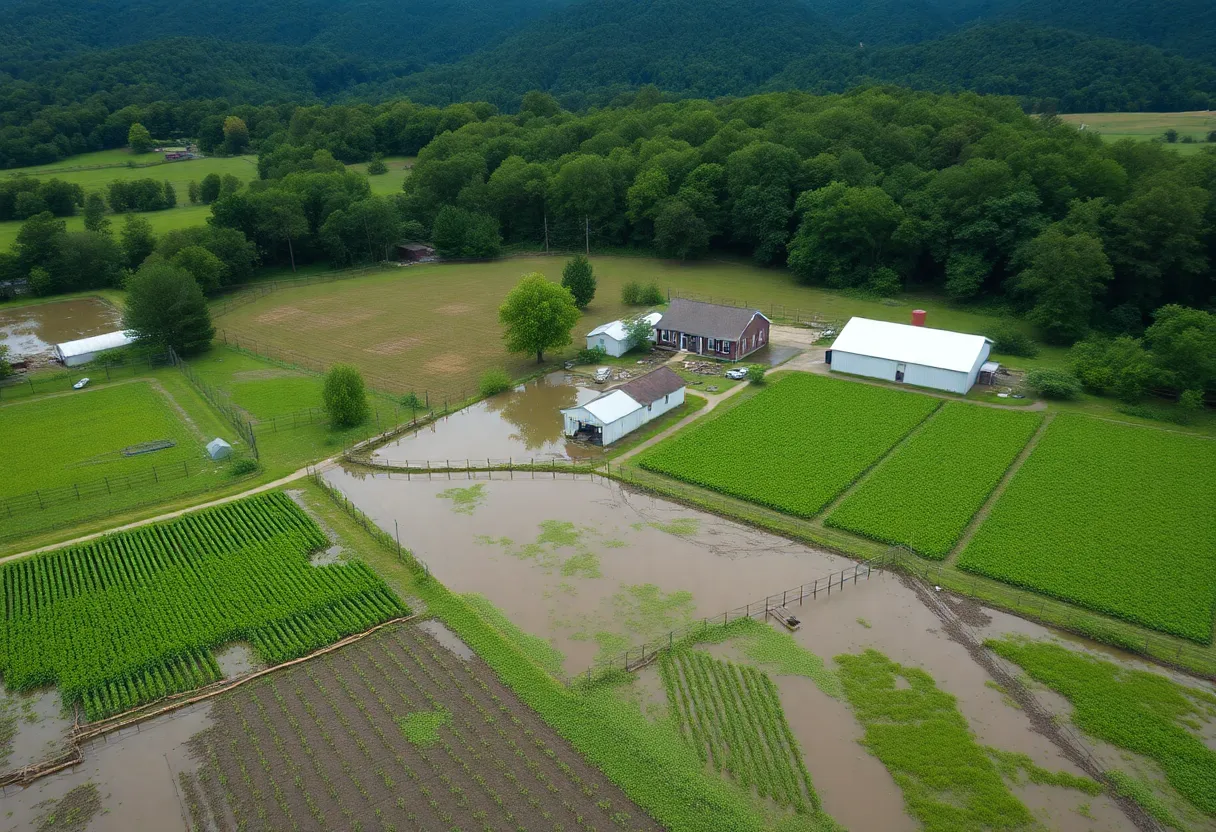News Summary
A report from the Appalachian Sustainable Agriculture Project highlights the severe impacts of Tropical Storm Helene on small family farms in Western North Carolina. Approximately 86% of farmers reported damage, with average losses estimated at $30,000 per farm. Many faced challenges accessing markets following the storm, and recovery programs often inadequately support these small-scale operations. The report indicates a significant threat to the sustainability of agriculture in the region, revealing broader economic repercussions and urgent needs for better assistance.
Asheville, North Carolina – A recent report released by the Appalachian Sustainable Agriculture Project (ASAP) on May 7 reveals the devastating consequences of Tropical Storm Helene on small family farms in Western North Carolina. The storm, which struck in September, has been characterized as a deadly event that wreaked havoc across the agricultural landscape. The ASAP report emphasizes the storm’s impact through personal accounts from farmers and detailed assessments of the damage incurred by local agriculture.
According to the data gathered from approximately 300 farmers through surveys, calls, focus groups, and workshops, 86% of the farms reported experiencing some form of damage due to the storm. While the physical damage for most of these farms remained below 25% of total operations, 70% of farmers noted damage to their land or waterways, indicating a significant threat to agricultural sustainability in the region. The average recovery cost per farm was estimated at around $40,000, illustrating the financial strain placed on these small-scale operations.
The report also highlights the broader economic repercussions of the storm, revealing an average loss of $30,000 in sales per farm for the year 2024, with projections suggesting that farmers could face an additional average loss of $28,000 in sales for 2025. Notably, the overall damage and losses associated with Helene accounted for 88% of the gross annual sales for farms in the Western North Carolina region.
Many farms that were not heavily damaged still encountered challenges, particularly in finding market outlets following the storm. In October 2024, the lack of viable market options further exacerbated the financial woes of these farmers. The report underscores a growing concern about the geographical and economic vulnerabilities of farming operations in Western North Carolina, where many are situated in low-lying river valleys prone to flooding. The average farm size in this area is 86 acres, considerably smaller than the national average of 463 acres, with more than half of the farms operating on fewer than 36 acres.
Another key finding of the report is that recovery program designs are often ill-suited for small family farms. Many such programs are tailored to larger commodity and commercial growers, leaving small farmers struggling to access the financial support they need. Farmers reported various challenges including soil contamination from floodwaters and substantial income losses resulting from the closure of restaurant accounts that utilized their products.
Despite the significant challenges and hardships faced, farmers have shown remarkable resilience, though a sense of fatigue is becoming apparent. The report indicates that while there is a collective will to recover and rebuild, many farmers express a longing for relief from the constant need to adapt and endure in the wake of such disasters.
Moving forward, ASAP has announced plans to release a second report in late 2025, which will focus on farmers’ experiences with accessing financial support and offer recommendations for enhancing assistance for small farms and local food economies throughout the Southern Appalachians.
In summary, the ASAP report highlights the profound impact of Tropical Storm Helene on small farmers in Western North Carolina, uncovering both the immediate and long-term challenges they face. As the agricultural community embarks on the road to recovery, the comprehensive analysis will provide a crucial framework for improving support systems and promoting resilience within this vital sector.
Deeper Dive: News & Info About This Topic
HERE Resources
Asheville Tourists Defeat Brooklyn Cyclones in High-Scoring Game
MANNA FoodBank Holds Farewell Ceremony After Flood Damage
The Radical Asheville Joins Hilton’s Tapestry Collection
Western North Carolina Tourism Revival Post Hurricane Helene
The Radical Hotel Joins Tapestry Collection by Hilton
New Art Supply Store to Open in Asheville
Buncombe County Cuts School Budgets by $4.8 Million
Baba Nahm Reopens in Asheville with a New Look
UNC Asheville Track and Field Shatters Records at Catamount Classic
UNC Asheville Track and Field Team Sets New Records at Catamount Classic
Additional Resources
- Blue Ridge Now: Helene Damage to Western North Carolina Farmers
- Fox Weather: North Carolina Flooding
- New York Times: Atmospheric River and Helene
- Fox Carolina: 86 Small WNC Farms Damaged by Helene
- Wikipedia: Tropical Storm Helene (2024)

Author: STAFF HERE ASHEVILLE WRITER
The ASHEVILLE STAFF WRITER represents the experienced team at HEREAsheville.com, your go-to source for actionable local news and information in Asheville, Buncombe County, and beyond. Specializing in "news you can use," we cover essential topics like product reviews for personal and business needs, local business directories, politics, real estate trends, neighborhood insights, and state news affecting the area—with deep expertise drawn from years of dedicated reporting and strong community input, including local press releases and business updates. We deliver top reporting on high-value events such as the Asheville Bread Festival, LEAF Festival, and mountain sports tournaments at Biltmore Estate. Our coverage extends to key organizations like the Asheville Area Chamber of Commerce and Explore Asheville Convention & Visitors Bureau, plus leading businesses in hospitality and brewing that power the local economy such as the Biltmore Estate and Sierra Nevada Brewing Company. As part of the broader HERE network, including HERECharlotte.com, HEREGreensboro.com, HERERaleigh.com, and HEREOBX.com, we provide comprehensive, credible insights into North Carolina's dynamic landscape.





